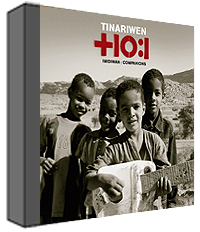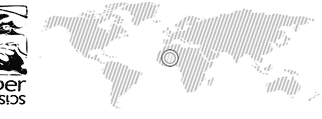Writer Paul Bowles referred to the experience of leaving the gates of a city and entering the Saharan desert at night as a baptism of solitude, albeit a disorienting one from which many don’t return alive.
The music of Tinariwen provides a glimpse into the band’s homeland of the Sahara region in northeastern Mali, and, as the light crowd at the Ogden Theatre discovered on Wednesday, it’s a hypnotic image that’s hard to turn away from, as beguiling and difficult to name as a mirage dancing above the sand.
Founded in 1979 by lead guitarist and singer Ibrahim Ag Alhabib, Tinariwen quickly became a symbol of rebellion for the nomadic Touareg people in their struggle for autonomy from the government of Mali. The band is comprised of former rebel soldiers who fought to maintain their boundary-less nomadic traditions as direct descendants of the Berbers, inhabitants of the Sahara regions of northern Africa for thousands of years. Tinariwen’s music was banned in Mali until a truce with the government was reached in the mid 1990s.
Without introduction, the seven current members of the band walked on stage adorned in robes and tagelmust, or cheche, the traditional Berber turban and scarf that Touareg men (but not women) wear to hide their faces. The presence of the cheche, combined with a rotating cast of musicians, made it hard to identify all of the band members, but then the seamlessness with which Tinariwen plays their instruments gives the band a kind of indivisibility.
From first song to last, all titled and sung in the Touareg language of Tamashek, there were no huge variances in rhythm or melody. Tinariwen’s polyrhythms might be considered trance music by some people, but there’s a subtlety to the interplay of layers all the same.
Ag Alhabib always led with an electric guitar line, the rhythm guitarist added another layer or, in many of the songs, produced an extremely low drone that rode almost below the bass. Two percussionists provided steady rhythms on hand drums, with Said Ag Ayad producing wood-crackingly sharp tones from the djembe to punctuate tempo. And Hassan Ag Touhami and Mina Walet Oumar sang harmonies, Oumar occasionally injecting songs with her high-pitched ululations.
Though the songs flowed into one another, a momentum seemed to build as the 90-minute set wore on. At some moments, there were loud echoes of American blues, at others, a George Jones kind of heartache. The hand drums and driving guitars created a perfect tension for the melodies and vocal harmonizing to ride atop. It was simple music, but it was precise.
As sourced from the band’s website, “assouf” is the name the Touareg themselves often use to describe Tinariwen’s heavy-guitar style of music. Assouf means the “blues, loneliness, heartache, longing, homesickness, the darkness beyond the campfire.” It’s no substitute for the Sahara, but listening to Tinariwen gives one a peek into that darkness behind the campfire.



